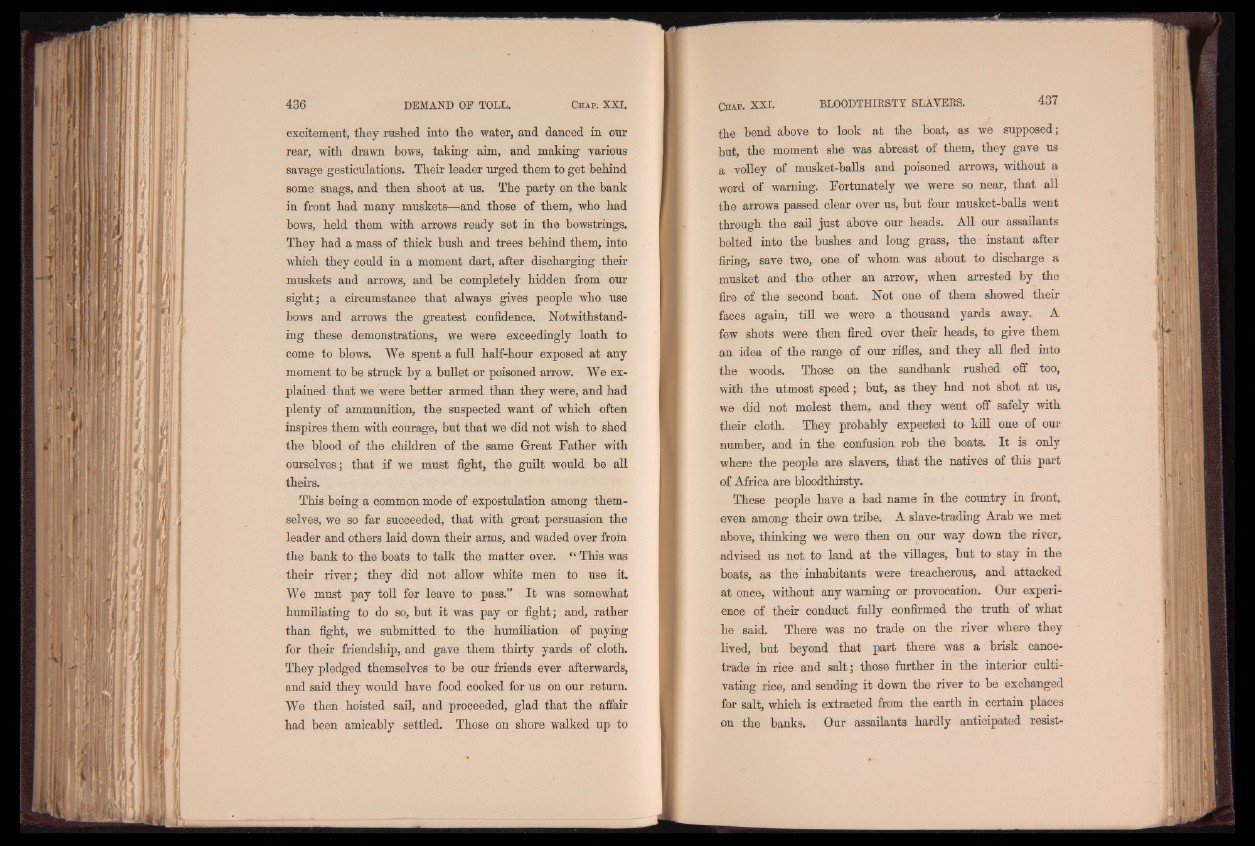
excitement, they rushed into the water, and danced in our
rear, with drawn bows, taking aim, and making various
savage gesticulations. Their leader urged them to get behind
some snags, and then shoot at us. The party on the bank
in front had many muskets—and those of them, who had
bows, held them with arrows ready set in the bowstrings.
They had a mass of thick bush and trees behind them, into
which they could in a moment dart, after discharging them
muskets and arrows, and be completely hidden from our
sight; a circumstance that always gives people who use
bows and arrows the greatest confidence. Notwithstanding
these demonstrations, we were exceedingly loath to
come to blows. We spent a full half-hour exposed at any
moment to be struck by a bullet or poisoned arrow. We explained
that we were better armed than they were, and had
plenty of ammunition, the suspected want of which often
inspires them with courage, but that we did not wish to shed
the blood of the children of the same Great Father with
ourselves; that if we must fight, the guilt would be all
theirs.
This being a common mode of expostulation among themselves,
we so far succeeded, that with great persuasion the
leader and others laid down their arms, and waded over froin
the bank to the boats to talk the matter over. “ This was
their river; they did not allow white men to use it.
We must pay toll for leave to pass.” I t was somewhat
humiliating to do so, but it was pay or fight; and, rather
than fight, we submitted to the humiliation of paying
for their friendship, and gave them thirty yards of cloth.
They pledged themselves to be our friends ever afterwards,
and said they would have food cooked for us on our return.
We then hoisted sail, and proceeded, glad that the affair
had been amicably settled. Those on shore walked up to
the bend above to look at the boat, as we supposed;
but, the moment she was abreast of them, they gave us
a volley of musket-balls and poisoned arrows, without a
word of warning. Fortunately we were so near, that all
the arrows passed clear over us, but four musket-balls went
through the sail just above our heads. All our assailants
bolted into the bushes and long grass, the instant after
firing, save two, one of whom was about to discharge a
musket and the other an arrow, when arrested by the
fire of the second boat. Not one of them showed their
faces again, till we were a thousand yards away., A
few shots were then fired over their heads, to give them
an idea of the range of our rifles, and they all fled into
the woods. Those on the sandbank rushed off too,
with the utmost speed; but, as they had not shot at us,
we did not molest them, and they went off safely with
their cloth. They probably expected to kill one of our
number, and in the confusion rob the boats. I t is only
where the people are slavers, that the natives of this part
of Africa are bloodthirsty.
These people have a bad name in the country in front,
even among their own tribe. A slave-trading Arab we met
above, thinking we were then on our way down the river,
advised us not to land at the villages, but to stay in the
boats, as the inhabitants were treacherous, and attacked
at once, without any warning or provocation. Our experience
of their conduct fully confirmed the truth of what
he said. There was no trade on the river where they
lived, but beyond that part there was a brisk canoe-
trade in rice and salt; those further in the interior cultivating
rice, and sending it down the river to be exchanged
for salt, which is extracted from the earth in certain places
on the banks. Our assailants hardly anticipated resist